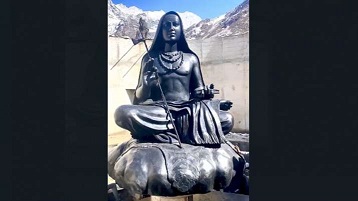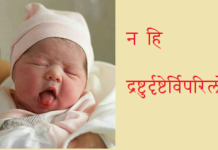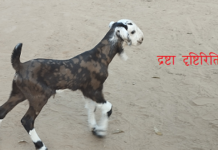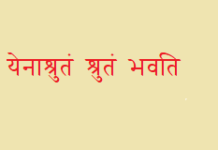Adi Shankaracharya (आदि शङ्कराचार्य)
Adi Shankaracharya is an eighth century religious teacher and Philosopher. According to commonly held view, Adi Shankaracharya was born in 788 AD.
Adi Shankara consolidated the doctrine of Advaita Vedanta. He is credited with unifying and establishing the main currents of thought in Hinduism. He wrote commentaries on the Brahma Sutras, Upanishads and Bhagavad Gita.
Childhood
Adi Shankara, as he is popularly known among his followers, was born in Kalady village -now a small town in the Ernakulam district – situated on the bank of a river in Kerala. He was an exceptional child as Adi Shankar had become fluent in Sanskrit by the age of two. By four, he was comfortably reciting scriptures including Vedas.
The burning quest for attaining superior knowledge from an early age pushed Adi Shankara to leave his home and set on the search for a guru. His quest ended with Govid Bhagvatpad at Omkareshwar (Madhya Pradesh) on the bank of Narmada river.
Adi Shankara excelled under the Govind Bhagvatpad, who instructed him to write commentaries on scriptures on completion of his learning. Adi Shankara was just 12 at the time.
Following his guru’s command, Adi Shankara wrote commentaries explaining the subtle meanings hidden in scriptures. He finished the task by the age of sixteen, after which Adi Shankaracharya is said to have stopped writing as he had completed writing all the major treatises on religion and philosophy.
Teachings
Adi Shankaracharya popluarised the Advaita branch of philosophy that declared that god and indivual were not two. He then set out to spread the message of his guru.
From the age of 16 to 32, Adi Shankaracharya travelled across the length and breadth of India with the message of Vedas. He pronounced that ‘Brahman or pure consciousness is the absolute reality and the material world is an illusion’.
He established his supremacy in religion and philosophy in debating duels with experts and chief of ashram after ashram from north to south and east to west.
Establishment of Ashrams
Having established his superiority among all exponents of religion and philosophy of the time, Adi Shankaracharya founded four ashrams – Badrinath, Puri, Dwaraka and Sringeri – in the four corners of the country.
The head disciple was appointed as the head of each of the four ashrams. These were the centres to elucidate the essence of Advaita philosophy. Each ashram was to follow one of the four Vedas – Puri for Rig Veda, Sringeri for Yajur Veda, Dwaraka for Sama Veda and Badrinath for Atharva Veda.
The essential duty of these institutions was to impart the teaching mushrooming of innumerable sects during his time due to narrow philosophical interpretation of Vedas and scriptures had led to multiplicity of gods and worship systems. The commoners were to be guided towards the idea of One God.
Work of Adi Shankara
Adi Shankaracharya wrote 18 commentaries on the scriptures including the Brahma Sutras, the Bhagavad Gita and 12 major Upanishads.
He wrote about two dozen books spreading the fundamentals of the Advaita Vedanta philosophy. Some of these books are Viveka Chudamani, Atma Bodha, Vaakya Vritti and Upadesa Sahasri.
Adi Shankaracharya is credited to have composed 72 devotional and meditative hymns such as Soundarya Lahari, Sivananda Lahari, Nirvana Shatakam, Maneesha Panchakam.
Samadhi
It is believed Adi Shankaracharya took samadhi at Kedarnath. It is said he was seen last by his disciples walking into the Himalayan woods at Kedarnath. He was not seen thereafter.
Complete work of Adi Sankaracharya
Following is the list of works by Shri Adi Shankaracharya which are widely accepted to be his works :
BHASHYA GRANTHAS
- Brahma Sutras
- Isavasya Upanishad
- Kena Upanishad
- Katha Upanishad
- Prasna Upanishad
- Mundaka Upanishad
- Mandukya Upanishad
- Mandukya Karika
- Aitareya Upanishad
- Taittiriya Upanishad
- Chandogya Upanishad
- Brihadaranyaka Upanishad
- Sree Nrisimha Taapaneeya Upanishad
- Bhagavad Gita
- Vishnu Sahasranama
- Sanat Sujatheeyam
- Lalita Trishati
- Hastamalakeeyam
PRAKARANA GRANTHAS
- Vivekachudamani
- Aparokshanubhuti
- Upadesasahasri
- Vaakya Vritti
- Swatma Nirupanam
- Atma bodha
- Sarva Vedanta Sara Samgraha
- Prabodha Sudhakaram
- Swaatma Prakasika
- Advaita Anubhuti
- Brahma anuchintanam
- Prashnouttara Ratnamaalika
- Sadachara anusandhanam
- Yaga Taravali
- Anatmasree Vigarhanam
- Swaroopa anusandhanam
- Pancheekaranam
- Tattwa bodha
- Prouda anubhooti
- Brahma Jnanavali
- Laghu Vakyavritti
- Bhaja Govindam
- Prapancha Saaram
HYMNS AND MEDITATION VERSES
- Sri Ganesa Pancharatnam
- Ganesa Bhujangam
- Subrahmanya Bhujangam
- Siva Bhujangam
- Devi Bhujangam
- Bhavani Bhujangam
- Sree Rama Bhujangam
- Vishnu Bhujangam
- Sarada Bhujangam
- Sivananda Lahari
- Soundarya Lahari
- Ananda Lahari
- Sivapaadaadi kesaanta varnana
- Siva kesaadi padaanta varnana
- Sree Vishnu-paadaadi-kesanta
- Uma maheswara Stotram
- Tripurasundari Vedapada Stotram
- Tripurasundari Manasapooja
- Tripurasundari Ashtakam
- Devi shashti upachara-pooja
- Mantra matruka Pushpamaala
- Kanakadhara Stotram
- Annapoorna Stotram
- Ardhanareshwara Stotram
- Bhramanaamba Ashtakam
- Meenakshi Stotram
- Meenakshi Pancharatnam
- Gouri Dasakam
- Navaratna Malika
- Kalyana Vrishtistavam
- Lalitha Pancharatnam
- Maaya Panchakam
- Suvarna Mala Stuti
- Dasa Sloki
- Veda Sara Siva StotramHara
- Siva Panchaakshara Stotram
- Sivaaparadha Kshamapana
- Dakshinamoorthy Ashtakam
- Dakshinamoorthy Varnamala
- Mrutyunjaya Manasa Pooja Stotram
- Siva Namavali Ashtakam
- Kaala Bhairava Ashtakam
- Shatpadee Stotram
- Siva Panchakshara Nakshatra Mala
- Dwadasa Ling Stotram
- Kasi Panchakam
- Hanumat Pancharatnam
- Lakshmi-Nrisimha Pancharatnam
- Lakshmi-Nrisimha Karunarasa Stotram
- Panduranga Ashtakam
- Achyuta Ashtakam
- Sree Krishna Ashtakam
- Hari Stuti
- Govinda Ashtakam
- Bhagavat Manasa Pooja
- Praata Smarana Stotram
- Jagannatha Ashtakam
- Guruvashtakam
- Narmada Ashtakam
- Yamuna Ashtakam
- Ganga Ashtakam
- Manikarnika Ashtakam
- Nirguna Manasa Pooja
- Eka Sloki
- Yati Panchakam
- Jeevan Mukta Ananda Lahari
- Dhanya Ashtakam
- Upadesa (Sadhna) Panchakam
- Sata Sloki
- Maneesha Panchakam
- Advaita Pancharatnam
- Nirvana Shatakam
- Devyapara-dha kshamapa stotra



















